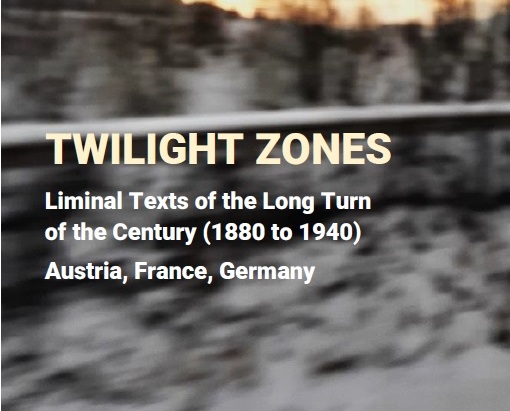The analytical digital anthology and the monograph "Twilight Zones. Liminal Texts of the Long Turn of the Century (1880 to 1940). Austria, Germany France are now online: http://gams.uni-graz.at/liminal
The starting point of the analytical digital anthology and the monograph was the detection of a new text corpus. The Collection assembles, defines, and examines texts which can be labeled as "liminal texts". They deny a classification into traditional systems, genres, and forms valid at the time. The texts are part of an epoch full of novelties. Around 1880 and continuing into the first decades of the 20th century broadly effective innovations in the sciences, the arts, in politics and society took place in France, Austria and Germany. Yet the anthology not only provides a new corpus and therewith innovative insights into the long turn of the century. The sampling and analyzing of the liminal texts present an ideal experimental field for current theoretical and methodological questions.
The analytical digital anthology is worked out on several levels:
- The project is carried by an interest in a newly elaborated corpus of German and French texts and the contextual and methodological challenges coming with it.
- An interdisciplinary cooperation between literary and cultural studies, cultural sociology and digital humanities built the base for a productive execution of the tasks.
- The anthology (open and at disposal for the research community and the public) functions as both, as a presentation of single texts and a corpus; it further offers the analysis of single texts and the corpus based on the application of a close reading with a newly developed system of categories.
- Furthermore, the anthology allows an interactive and flexible analysis for other users.
- Therefore, the anthology not only functions as a research tool for the project at issue but also for future handlings of the liminal texts and texts in general.
- Integrated into the anthology is a monograph with the task to describe the theoretical and methodological models developed for the collection of texts as well as the results of the practical use of it.
Project Group:
Susanne Knaller (Literary and Cultural Studies): concept, coordination and organization of the project including the conceptual design of the anthology, the category system, and the monograph.
Stephan Moebius (Cultural Sociology and Cultural Studies): contribution to the conceptual parts, the anthology, and the monograph.
Martina Scholger (Digital Humanities): responsible for the implementation of the digital anthology, for resolving all technical problems arising during the project and the discussion and contextualization of Digital Humanities concepts in the monograph.
Realized with the help of: Mario Huber, Heidi Howley, Marie Therese Pachner, Gero von Roedern, Gerlinde Schneider, Riccardo Schöfberger and Marie Stüger
The project has been conceptualized, organized, and coordinated at the Centre for Cultural Studies (University of Graz).
The Centre for Information Modelling was responsible for the technical implementation. The Center provides the respository GAMS (Geisteswissenschaftliches Asset Management System) http://gams.uni-graz.at.
